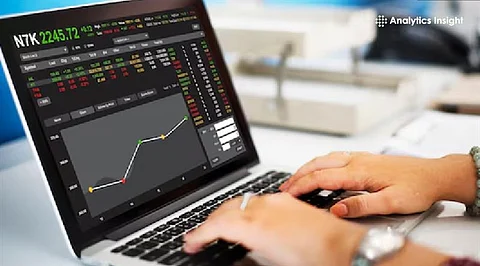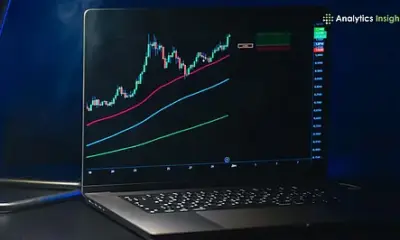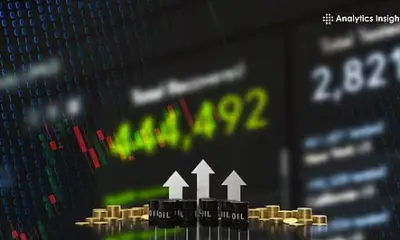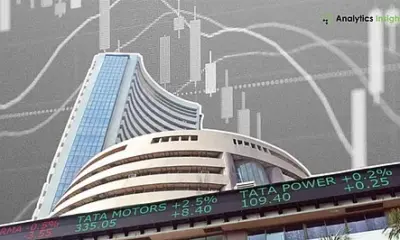Technology
Indian Stock Market Declines: Sensex Falls 269 Points Amid IT Weakness

The Indian stock market faced a decline today, with the Sensex dropping 269 points to settle at 83,041.81 and the Nifty 50 falling by 76 points to 25,433.45. The downturn was heavily influenced by underperforming stocks in the IT and telecom sectors, although gains in banking stocks provided some support.
The market showed bearish tendencies, particularly as major IT companies such as TCS, HCL Technologies, and Tech Mahindra recorded losses between 1% and 1.4%. The BSE SmallCap index fell by 0.46%, while the Nifty IT index decreased by 1.15%. In contrast, the Nifty Bank index emerged as a highlight, rising by 0.25% to reach 57,697.15 at press time, bolstered by strong buying interest in financial stocks.
Despite the overall market decline, some individual companies reported positive earnings. Aarti Industries announced a remarkable 104% year-on-year profit surge to Rs 106 crore, while LIC recorded a 32% increase in net profit at Rs 10,053 crore. These strong performances contrasted with the disappointing results from Birlasoft, whose consolidated profit fell by 9% to Rs 116.1 crore.
Market Movements and Corporate Developments
Amidst the fluctuations, Mahindra & Mahindra divested a 3.45% stake in RBL Bank, amounting to Rs 677.95 crore. Notable global investors, including Goldman Sachs and Morgan Stanley, participated in this deal, which saw RBL Bank shares closing near Rs 325, just below their 52-week high.
The National Company Law Tribunal approved the merger of Suzuki Motor Gujarat with Maruti Suzuki India, a decision that affected Maruti’s stock price, which is currently valued at Rs 15,363.15. Following the announcement, the stock dipped by 0.58%, though it reached an intraday high of Rs 15,460.05.
In terms of the broader market sentiment, foreign portfolio investors (FPIs) pulled out Rs 3,263 crore from Indian equities on November 6, while domestic institutional investors (DIIs) partially offset this with Rs 5,283 crore in net buying. The Indian rupee opened slightly weaker at 88.66 against the US dollar, reflecting cautious sentiment ahead of significant global events.
Investor Insights and Future Outlook
The performance of gold exchange-traded funds (ETFs) highlighted a trend towards safe-haven assets, with record inflows of US$850 million in October alone. This brings total year-to-date inflows to US$3.05 billion, demonstrating a strong preference among investors for stability amid global uncertainty.
Economist Neelkanth Mishra expressed optimism about the Indian economy’s growth trajectory, forecasting GDP growth to exceed 7% by FY26, supported by robust consumption and manufacturing. Although analysts anticipate continued volatility in the short term, the long-term outlook for the Indian stock market remains optimistic, buoyed by strong corporate earnings and renewed foreign interest.
In summary, while the Indian stock market faced a downturn today due to pressures in the IT and telecom sectors, strong performances from specific companies and ongoing investor interest in banking stocks provided a glimmer of hope. Investors are advised to remain vigilant as market dynamics continue to evolve.
-

 Technology5 months ago
Technology5 months agoDiscover the Top 10 Calorie Counting Apps of 2025
-

 Health2 months ago
Health2 months agoBella Hadid Shares Health Update After Treatment for Lyme Disease
-

 Health3 months ago
Health3 months agoErin Bates Shares Recovery Update Following Sepsis Complications
-

 Technology4 months ago
Technology4 months agoDiscover How to Reverse Image Search Using ChatGPT Effortlessly
-

 Technology1 month ago
Technology1 month agoDiscover 2025’s Top GPUs for Exceptional 4K Gaming Performance
-

 Technology2 months ago
Technology2 months agoElectric Moto Influencer Surronster Arrested in Tijuana
-

 Technology5 months ago
Technology5 months agoMeta Initiates $60B AI Data Center Expansion, Starting in Ohio
-

 Technology5 months ago
Technology5 months agoRecovering a Suspended TikTok Account: A Step-by-Step Guide
-

 Health4 months ago
Health4 months agoTested: Rab Firewall Mountain Jacket Survives Harsh Conditions
-

 Lifestyle5 months ago
Lifestyle5 months agoBelton Family Reunites After Daughter Survives Hill Country Floods
-

 Technology4 months ago
Technology4 months agoHarmonic Launches AI Chatbot App to Transform Mathematical Reasoning
-

 Technology3 months ago
Technology3 months agoUncovering the Top Five Most Challenging Motorcycles to Ride





















